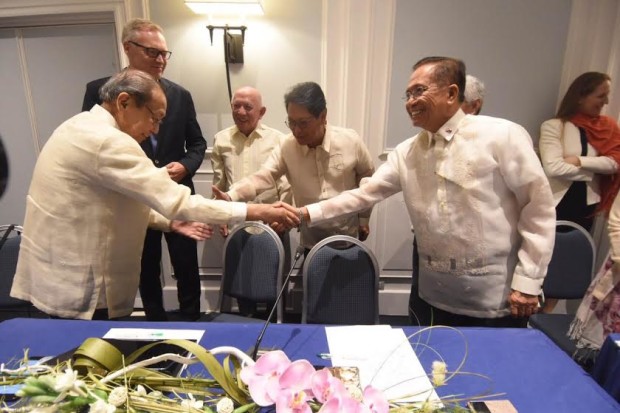Groups hail resumption of peace talks
Just days after President Rodrigo Duterte ordered soldiers to flatten the hills in going after the New People’s Army, the peace panels of the government and the communist-led National Democratic Front of the Philippines (NDFP) announced that peace talks were back on track.
Peace advocates and groups welcomed with relief the decision of the government and the rebels to resume the formal talks after weeks of intense fighting on the ground.
“We thank God for the resumption of peace talks between the GRP [Government of the Republic of the Philippines] and the NDFP. No more killings,” said Jesuit priest Joel Tabora, president of Ateneo de Davao University.
The NDFP is the political arm of the Communist Party of the Philippines (CPP).
Community-based peace organization Balay Mindanaw said the recent development was a celebration for renewed hope for a just and lasting peace.
Article continues after this advertisementIn a joint statement signed on Saturday, both parties, which met for two days in Utrecht, The Netherlands, not only agreed to resume the negotiations but also to reinstate the indefinite unilateral ceasefire declarations while working on an interim bilateral ceasefire agreement. Norway facilitated the informal talks on March 10 and 11.
Article continues after this advertisement“The parties shall continue the formal peace talks and reiterate their reaffirming of all bilateral agreements and statements made in the GRP-NDFP peace negotiations, including the Hague Joint Declaration, the Joint Agreement on Safety and Immunity Guarantees (Jasig), and the Comprehensive Agreement on Respect for Human Rights and International Humanitarian Law,” they said.
The presidential adviser on the peace process, Jesus Dureza, said the unilateral ceasefires and the Jasig would allow the rebels’ consultants to move freely and be safe from arrest.
In a statement, Dureza said Mr. Duterte was kept informed of developments in efforts to go back to the negotiating table.
Ceasefire reinstated
The parties agreed that reinstating the indefinite unilateral ceasefire declarations before the scheduled fourth round of talks in April would help create a better atmosphere for the resumption of the stalled negotiations.
A bilateral ceasefire agreement will also be discussed and signed by the government and the NDFP in the next meetings.
This will replace the unilateral ceasefire declarations and would establish more stable mechanisms, including monitoring and prevention of tensions that might trigger hostilities.
The military welcomed news of the breakthrough but said it would await formal notice from government negotiators and Mr. Duterte’s instructions.
“Pending this, all military operations will continue and remain at current state,” it said in a statement.
The guerrillas said they would remain vigilant because of continuing counterinsurgency operations but added they were optimistic with the talks’ resumption.
“Instead of putting the lives of millions of people in harm’s way, such as Mr. Duterte’s all-out war declaration, better yet we try to settle our differences at the negotiating table,” said the Melito Glor Command.
Founded in 1968, the CPP has unsuccessfully tried to negotiate with five Presidents before Mr. Duterte. The rebellion, one of Asia’s longest, has left about 40,000 combatants and civilians dead and stunted economic development.
Mr. Duterte had reopened stalled peace talks with the 4,000-strong communist rebel movement after taking office in June.
His administration released captured rebel leaders and both sides had called separate ceasefires to pave the way for peace talks overseas.
But the rebels lifted their unilateral ceasefire on Feb. 10 after accusing government of failing to release all political prisoners and the military of deploying troops in rebel-controlled communities. —WITH REPORTS FROM JEROME ANING, AFP AND AP
